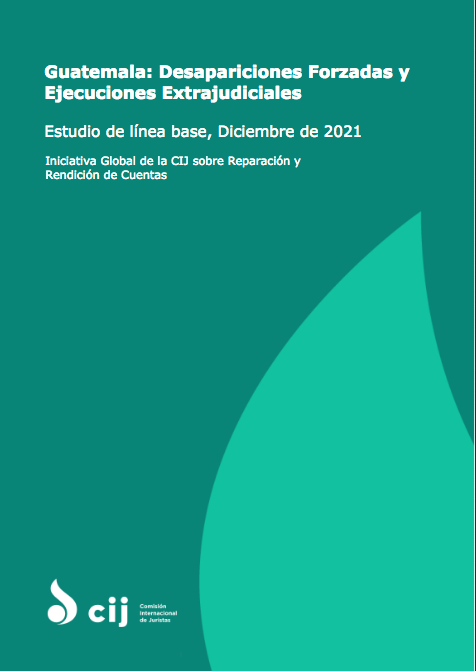Guatemalan officials and the justice system as a whole have failed to deliver accountability and provide redress for enforced disappearances and unlawful deaths, said the ICJ in a report released today. It is estimated that around 45,000 people were subjected to enforced disappearance during the internal armed conflict (1960-1996), including some 5,000 children.
The baseline study Guatemala: Desapariciones Forzadas y Ejecuciones Extrajudiciales, Estudio de línea de base (published in Spanish), identified key obstacles to obtaining accountability for crimes under international law committed during the internal armed conflict, including serious deficits on judicial and prosecutorial independence.
The report also identified that there is no legal framework for searching persons that disappeared during the conflict and that civil society organizations integrated by family members of the disappeared are the ones that have led the searches and the seek for justice.
Also, the report mentions that although there were different public institutions that were in charge of implementing the Peace Accord and protecting human rights, the government recently abolished those entities and created only one to concentrate all functions that is not duly funded. This is a setback in the institutional framework that protected human rights in the country.
The ICJ recommends that the Guatemalan authorities:
- Guarantee the independence and autonomy of judges and prosecutors in charge of cases of enforced disappearance and extrajudicial killings and deliver proper accountability for these serious human rights violations. Some of these judicial and prosecutorial authorities have been subjected to threats and reassignments when they have done a good work.
- Search the persons that disappeared during the conflict and prevent the commission of serious human rights violations in the country.
- Ratify the International Convention for the Protection of All Persons against Enforced Disappearance, as Guatemala is one of the few Latin American countries that is not party to the Convention. The ratification is important for protecting victims’ rights as it provides an additional tool to assert their rights and improve the State’s accountability.
Background
The baseline study was drafted within the project “Promoting justice for enforced disappearances in Colombia, Guatemala and Perú”, that ICJ implements with the support of the European Union. This project is implemented under the ICJ’s Global Accountability Initiative, which has also produced baseline studies for Cambodia, Colombia, Eswatini, Myanmar, Nepal, Peru, Tajikistan, Tunisia and Venezuela.
Contacts:
Kingsley Abbott, Director of Global Accountability & International Justice. Email: kingsley.abbott(a)icj.org
Carolina Villadiego Burbano, Legal and Policy Adviser for Latin America, and Regional Coordinator of the Project. Email: carolina.villadiego(a)icj.org
Rocío Quintero M, Legal Adviser, Latin America. Email: rocio.quintero(a)icj.org





